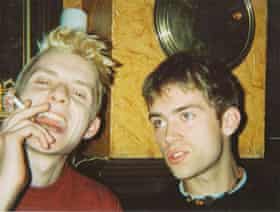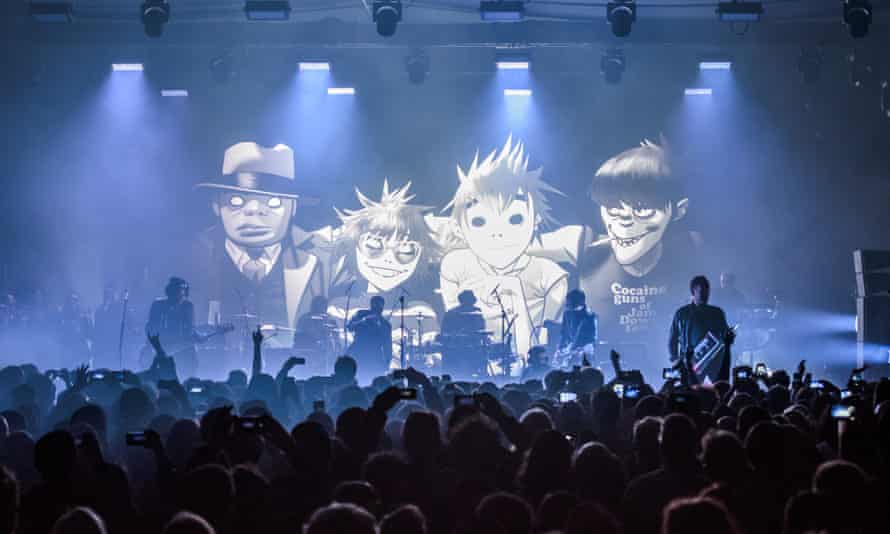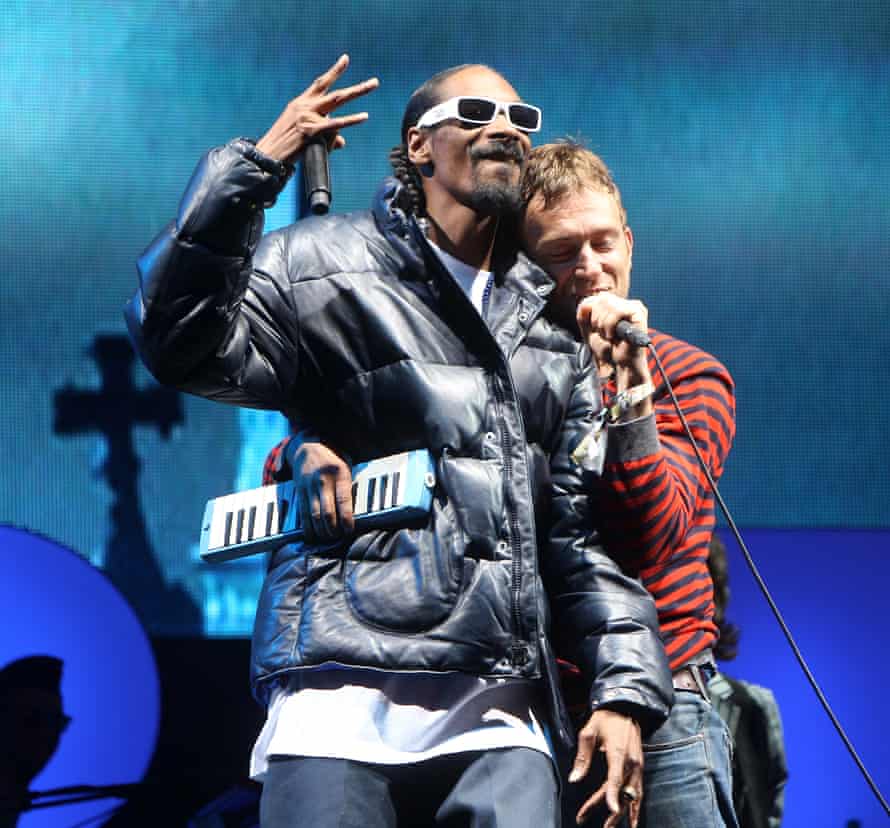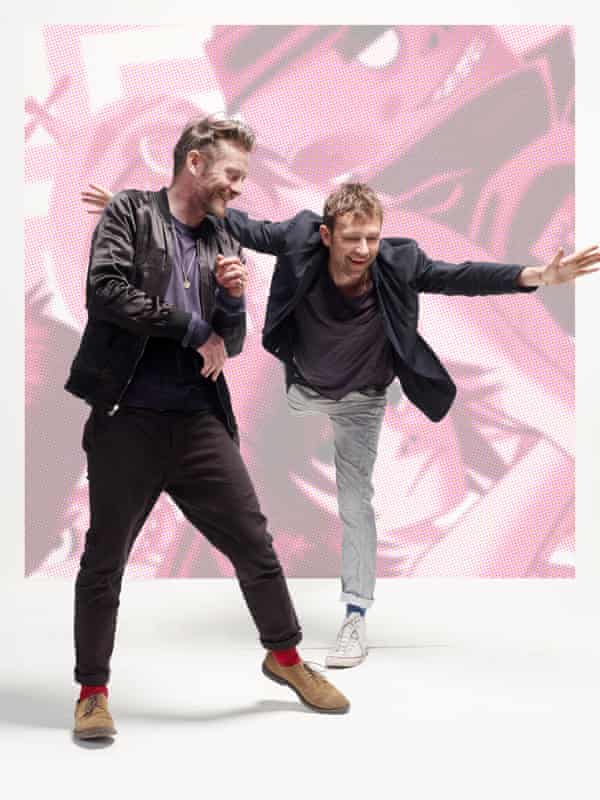Damon Albarn Jamie Hewlett Funny Moments
O n the top floor of his west London studio, "13", Damon Albarn is sitting at a small wooden table that his dad made sometime in the 1970s. In front of him are a glass of nettle tea, some freshly squeezed juice in a union jack mug and a single cigarette. He's in a good mood, and he is talking about Gorillaz, the cartoon band that he formed with Jamie Hewlett almost 20 years ago.
Unfortunately, he is not being clear. I've just asked him if the music that he makes on the new album – soulful, urban, with contributors including Mavis Staples, Pusha T, Jehnny Beth and Benjamin Clementine – marries up at all with Hewlett's drawings of 2D, Murdoc, Russel and Noodle, the cartoon members of the band.
"Well, I don't think that matters," says Albarn, cheerfully. "Gorillaz isn't about anything specific. It's very unruly. You can go anywhere and do anything, and that's the whole point of it. There's no agenda. I'll go with what's exciting, and I'll make it work, because I can pretty much lend my hand to anything, musically. Also, I could keep knocking out tunes for the next year or two. So, just look at this album as the nucleus of something much bigger."
I make a face.
Albarn says, "You know, a lot of things don't make sense at the moment. This is just another one of those. It's very à la mode!"
Grr. He can be a frustrating interviewee, because he doesn't like unpicking his creative process, talking the magic away. This is what he says about his lyrics on the new Gorillaz record: "I get my chords and then I improvise the words in one take. It's a subconscious thing, so I think of my language as somehow connected to the future or the past. Untethered to now. And with this record, I mostly left the words as they came out." He doesn't want to explain, because he's not really sure what his lyrics are about.
Let's talk about his everyday life for a bit, instead. On Saturday night, Albarn and Missy, his 18-year-old daughter, went out to celebrate the 17th birthday of Jamie's younger son, Rocky. They drank sake. Missy told Albarn she thinks she could drink as much as him; he didn't want to disillusion her. (Her mum, his partner, Suzi Winstanley, is teetotal.) He's on his own with Missy for a week – "She's really interested in politics and film. One of the most heartwarming things for me is, occasionally, when it's not trap music booming out from her room, I hear Radio 4. And I think: Ah, you are my child!" – and is vaguely wondering how much he should be parenting her.
Albarn famously keeps working hours at his studio: 10am-5pm every day. He cycles there from his house (he lost his driving licence 18 years ago, and never bothered to get it back), and before he does anything, he shoves vegetables, fruit and ginger into the studio's industrial juicer and hands the juice out to anyone who's about. For the past three years, he's added yoga into his routine. He started with a teacher coming to his home, but soon realised he likes the friendliness and surprise of classes. He tries to go to a class every day, no matter where in the world he finds himself: Jamaica, Japan, the US. The only place he couldn't find one was Bamako, in Mali. He'd like, he says, and it's only partly a joke, to write a Lonely Planet guide to the world's best yoga classes.
He catches himself and starts laughing. "Listen to me," he says. "International yoga guide. Who'd have thought?"
Yoga, juicing and being untethered to now weren't part of the original Gorillaz lifestyle. The band started at the end of the 1990s, when Albarn and Hewlett lived together in a gadget-packed, boy's own first-floor flat in Notting Hill. Then, Albarn was known as the singer and songwriter of Blur; Hewlett as the co-creator and artist of the comic book Tank Girl. They were both heartbroken (Damon over his split with Justine Frischmann, Jamie over his with Jane Olliver, Justine's friend – though he and Jane got back together for a time and had two sons) and they bonded over lost love and silly toys. Despite their upset, their flat was a fun place to be. When you visited, there was always something in the background making an unexpected noise: a robot, a watch, something digital or musical.

They had a big telly and watched a lot of MTV. The original idea for Gorillaz came about because they thought so many pop groups made lame interviewees, and because Albarn wanted to make hip-hop, which he could never do with Blur. He needed to be anonymous in order to experiment: "People weren't meant to know it was me," he says. "Even now I think, during the gigs, I'm going to be able to go off, go backstage and make myself a drink and a hologram will take my place for a couple of songs." (This has not yet happened.)
Gorillaz was, unexpectedly, a huge success. In the US, the first album outsold the whole of Blur's output. People loved the band. And so, over the next 13 years, Albarn and Hewlett worked and partied and made two more Gorillaz albums, plus Monkey: Journey to the West, an opera created for the Manchester international festival in 2007, which toured the world. They knocked around in the same group of mates; their kids grew up together. For a while, during the making of their last album, 2010's Plastic Beach, Jamie had an animation studio, employing a few staff, on one of the floors of 13.
Now, the two of them live far apart. Albarn is still in west London, settled in his studio, his home, his long-term relationship. Hewlett met his new wife, actor Emma de Caunes (daughter of Antoine), at a Gorillaz gig (she read his tarot cards), and moved to Paris in 2010 to live with her and her daughter, Nina, now 14. His boys, Denholm (21) and Rocky (17), live in Leeds, but are moving to London for work and will live in Jamie's London flat.
Aside from their history, Albarn and Hewlett have a lot in common: a portrait-in-the-attic youthfulness, a bovver-street way of dressing, a cheekiness (more confrontational in Albarn), a dislike of talking about their art in specifics. They both get bored very quickly. They both love to work. They both spark off each other, but they create separately. They're like brothers, but they stopped talking in 2011 and didn't communicate for three years.

Before we get to that, though, let's try and explore Humanz, Gorillaz's fourth album (if you don't count The Fall, which is more like a tour notebook). Hewlett (whom I meet separately) is telling me the story. We're in a glass-walled side office at the film company where he works when he's in London; he faces away from the main office, to stop him getting distracted. As soon as the pair decided to do another album, he immediately began making visuals. He wrote little stories about each of the Gorillaz characters that moved them on from Plastic Beach and situated them in a studio called 14, next door to Damon, in west London.
"I see the "z" in Humanz as referring to robots, AI, programming, brainwashing, indoctrination," he says. "And it's a question to us: are we human or are we humanz? Have we lost the ability to think for ourselves, do we just believe what we're told? That's how I see it. And the reason the characters appear on the album cover as a real-life version of themselves is because I'm wondering: are these characters becoming more human than us?"
That is not what Albarn says, when I ask him: "'Pain, joy, urgency' was the mantra of these sessions. Those words were always one of the first things that I talked about with collaborators. Also, I had this mad idea of imagining what it would be like if Donald Trump won the US election. Like, what's the darkest, most twisted fantasy I can come up with? I liked the idea of the album taking place on the night of this massive culture shock. How would people feel? The record is not polemical, it's quite abstract. It's just that I wanted to imagine the near future, because this record for me was always slightly futuristic. Hence the name Humanz."
Clear now? Good. Anyhow, the resulting LP is, according to Albarn, "about America. Pre-post-Trump America." Sessions were recorded in Chicago, Jamaica, Paris, London. Towards the end of the process, he took out many of the non-US contributors, including Graham Coxon, Héloïse Letissier from Christine and the Queens, and Rag'n'Bone Man. He also took out any English rap and all direct Trump references, because he didn't want to give him any more promotion. Other than that, he was keen for the album "to be a record of male and female voices. Really well balanced."
None of which seems to have much bearing on Gorillaz as Hewlett's visual entity. The band exists in its own universe, and if you want to experience it, you can do a virtual tour via the Gorillaz app. Or you could watch the latest video, for the single Saturnz Barz (Spirit House), which gives you an entire world, from scrunched-up tissue to spinning star, a world where you can move from a haunted house into outer space. On its release, it broke all records for viewings of a 3D video. On Instagram, you can see short film clips; on YouTube you'll find a full-length interview done by MistaJam with 2D and Murdoc, where they're sitting on a sofa in a room with him, answering questions sent in by fans. You can head to a Gorillaz festival: Demon Dayz, a one-dayer on 10 June at Margate's Dreamland. A TV series is ready to go. Gorillaz is an art project gone supernova.
When Albarn wants to work with someone, he writes them a letter. Not an email; a letter. He writes to icons (Sade, Dionne Warwick, Morrissey and Barry Gibb all said no), but also up-and-coming talent. Sometimes, these are brought to his notice by Remi Kabaka Jr, or by Anthony "the Twilite Tone" Khan, who both co-produced Humanz. If Albarn hears a young artist's music and thinks there might be "some sort of kinship", he writes the letter. "I love working with people. I don't like being on my own in the studio. And the amazing thing about working with other people is that everyone's got their own way of doing things. I love it."
We talk about some of his collaborators on Humanz, such as Grace Jones: "Doing headstands at two o'clock in the morning, after a couple of bottles of wine and whatever else. She is slightly supernatural." And his old rival, Noel Gallagher: "Once he stopped being totally defined by Oasis, he started to feel different about a lot of things – and that was when we started talking. He's got a very different kind of voice from mine, it's super-melodic, and he works really accurately."
Do you phone each other up now, then?
"Noooo! Though I did call him the other day, after the game (he means Chelsea v Man City: City lost) to say, 'Do you want to go for a drink?' Surprisingly, he wasn't really up for it."
God, you're a proper wind-up, I say. He digs in his pocket and brings out a badge. It says: "Trust Me, I'm A Cunt." He grins. His gold tooth glints.
Why did you fall out with Jamie? I ask.
"There's a lot of competition between men," he says. "I think it's always been about that. But I was just devastated that I'd lost such a close friend. That he'd just left me."
It happens quite a bit with you, though, I say. You fall out with your close male friends.
"That's true," he says. "With Jamie, it was horrible. It's so horrible when it happens... I just dig my heels in and go, 'Right, I ain't fucking moving.' And then slowly, you start to move a little bit. Because you've forgotten what it was about, and also, you always really liked them anyway. And, you know, I may fall out with a lot of people, but I've also managed to reconcile with a lot of people."
I ask Hewlett about the fall-out too. Even now, he says, "we fight at everything. We'd fight over a worm if we found it at the same time. It's hilarious, but it's stupid. We're in a restaurant, we fight. In a taxi, we fight. In front of people, we fight. It's just one-upmanship. School for Scoundrels. He's an intense person to be friends with, I mean. A lot is required."

It must have been strange when the arguing stopped and they didn't speak for three years. They can't or won't say what happened, but, in essence, Hewlett felt that his contribution to Gorillaz was being diminished. For the Plastic Beach album, he was meant to make four elaborate videos, which would have told the full story; but the budgets were pulled by EMI when he'd only made two. Then Gorillaz went on tour and, says Hewlett, "Damon had half the Clash on stage, and Bobby Womack and Mos Def and De La Soul, and fucking Hypnotic Brass Ensemble and Bashy and everyone else. It was the greatest band ever. And the screen on stage behind them seemed to get smaller every day. I'd say, 'Have we got a new screen?' and the tour manager was like, 'No, it's the same screen.' Because it seemed to me like it was getting smaller."
Added to this, he says that he had lost his way a bit, partying a little too hard, "not considering myself", and so… he met Emma and he left. He pulled out of Gorillaz and he pulled out of Dr Dee, the opera he was working on with Albarn, and he shut down his animation studio and moved to Paris. "I just didn't want to fucking work with him. I didn't want to see him."
They reconciled at a friend's Christmas party in 2014. Hewlett says: "I knew the first words that came out of his mouth would be, 'All right, poof?' And he came over and said, 'All right, poof?' And I said, 'Hi, Damon.'"
During their hiatus, Hewlett painted a lot. He had an idea for a live-action film, which he worked on but then abandoned. ("When projects don't work, I feel pissed off for about a week and then I get over it.") He created work for his acclaimed solo shows at London's Saatchi Gallery. Albarn did what he does, which is to make music. In his Jamie-free years, he made albums for different projects: Kinshasa One Two, an Oxfam charity album made with musicians from the Democratic Republic of the Congo; Maison Des Jeunes with Africa Express; Rocket Juice & the Moon. He finished the Doctor Dee opera, performed in it on stage and released the album; closed the 2012 Olympics ceremony with a huge Blur gig in Hyde Park; made a solo album, Everyday Robots , and toured it. Blur also toured and made an album, which is what delayed the start of Humanz.
Hewlett, meanwhile, kept working alone.
"I don't like collaborating too much," he says. "I'm all about doing things myself because I find it hard to trust other people. Not trust, but I know exactly what I want to do and I know exactly how it's supposed to look. And so to do it myself is fine, you know? Sometimes I involve other people, but what often happens is that I come up with an idea for a video, and because I don't really know the advances in animation and the technology that's available, they say, 'We can't do this yet.'"
Hewlett films nearly all of what happens with Gorillaz, and hangs out in the studio when Damon is making the music. "An amazing thing happens when Damon and I have people coming into the studio," he says. "There's that initial moment when they're a bit uncomfortable, and then they start becoming musical with each other and it's a different story. When we had Mavis Staples in, it took a while for her to get into the song, and there was a moment with her and Damon, and Damon's got his guitar, and she's sitting next to him, and Damon's taking her through it. And then, after an hour, they suddenly find this connection, and it's really strong. You can see it on the film. It's a breakthrough, like they discover this little love affair through music and they make a song. You can't have that as an artist, you know?"

Albarn travels a lot, working, and it informs how he thinks and feels about the world. He tells me about playing a big gig in the old citadel in Damascus, about five months before the Syrian civil war really kicked off. He has musician friends there who took him round monasteries and to meet a Bedouin prince, lent him an old motorbike so he could drive around Palmyra by moonlight. After the war started, he brought over 20 of those Syrian musicians for a tour; they played Glastonbury, Roskilde, Istanbul.
"Then a lot of them went back, and some of them just disappeared into the night after the last gig," he says. Some of them have settled here.
Albarn does not have a Brexit attitude to that, or anything else.
"It's just such a mess, the Middle East," he says, "and a lot of it stems back to Tony Blair and George Bush in 2003 [and the invasion of Iraq]. That's why the whole idea of Brexit is so tragic, because people were hoodwinked into this idea that they were imminently going to be invaded by millions of marauding hordes. But those hordes were only moving away from their homes because of the direct influence, the direct tremor [of the Iraq war], which we had not only very strongly as a country said we were against, and has now proved to have been an utter disaster. Brexit would never have been anything other than a sort of prosaic, mechanical thing if it hadn't been spiced up with all of that."
There should be a new referendum, he says, but knows it won't happen. (He saw Michael Gove recently in the street and shouted at him, called him a xenophobe.) His next album with his band the Good, the Bad & the Queen is going to be a post-Brexit record, "like Parklife – stories about Britain – but less jaunty".
Albarn's way of making music, the way he goes out to gather it, changes him, and that's the point.
"All I want to do is meet new people," he says, "learn about them, and maybe do new shit because of that. I don't want to threaten people's way of life at all. There's just so much to be learned from being sensitive to other people, you know? There are so many flavours…
"If we really, truly as a country, want to leave, then, OK. If you really don't want to go to France and you really don't want to go to Spain, and you really don't want to go to Portugal, and Italy, and you really don't want to go to Greece, or Crete or Majorca… and you have no desire to go to Iceland or Denmark, or even if you really can't bear the thought of going to Ireland, fine. Stay home. But personally, I'm going to carry on going to those places because I really like them. As well as I really love the country I live in."
He stops. Rant over. Except it isn't, really, is it?
"No. It's all part of a long conversation. We'll get back to it."
When he was making Humanz, during 2015 and 2016, Albarn knew, in his bones, he says, that Donald Trump was going to get in. Sometimes he thinks he can see the future, and sometimes he can't. "When I did all that study for Dr Dee, it really changed me. I was able to articulate stuff I instinctively felt. I always had a slightly witchy element to my psyche. The role of magic is not to be underestimated."
It's why he doesn't want to explain; and why he wants to mix and create with other people. When he makes music with other people, he can feel the magic: "Definitely, definitely. The spirit… we all feel the spirit, you know, it exists," he says. "It's an energy, it's whatever you want to call it, it exists. And the beautiful thing about it is it's there for everyone. Whether you're a billionaire or you're living on the street – the spirit is there for you.
"The only way you're not going to feel it is if you close yourself off completely."
And why would anyone do that?
Source: https://www.theguardian.com/music/2017/apr/30/damon-albarn-and-jamie-hewlett-we-fight-over-everything-gorillaz-humanz-interview
0 Response to "Damon Albarn Jamie Hewlett Funny Moments"
Postar um comentário